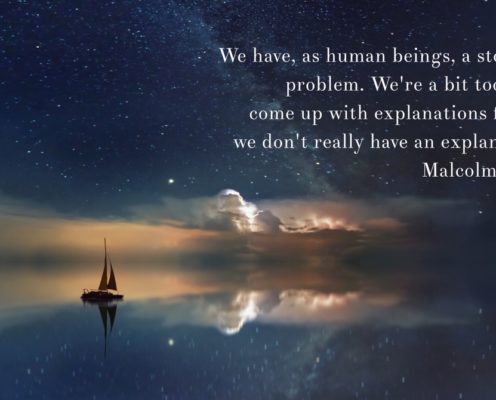Did you know you have blind spots in your vision? There is a tiny place in the physiology of each eye that lacks cells that respond to light and help form perception. We don’t actually see these spots in our vision because the brain is so extraordinarily good at filling in that data.
And so it is with much of our perception of the world. The mind fills in what we do not yet know with data it pulls from memories of past experience.
So when we find ourselves in a new situation we’ve never been in, we still make assumptions about what experience will take form… instead of being open to whatever shows up. When we see someone for the first time, we tend to make immediate judgments about them.
Maybe we take the same route to work everyday. Even though there are a million possibilities for environmental factors that could change our daily experience, we still set forth with the expectation that everything about taking that route should be the same. Because our internal wiring demands it. The brain actually fills in gaps in our perception of the present with information garnered from a past…and hides that fact so well we don’t question it.
Although the brain is wired that way to protect us, it also poses a risk to our well being. Our belief that we know prevents us from being truly present and observant. It prevents us from even questioning that belief, and keeps us in the same loop until a majorly disruptive event jars us from our practiced pattern.
Some of us have such well-rehearsed negative thoughts about ourselves, caused by past experiences or trauma, that we can easily spiral into an episode of self loathing. And because the emotional pull is so strong, it becomes even harder to question those thoughts once the momentum builds.
For those who resonate, I suggest beginning a regular practice of questioning our own thoughts. We don’t spend nearly enough time questioning our perceptions and beliefs. Whether they are about the world, about our relationship with the environment, or about ourselves.
The author and teacher Byron Katie begins her mindfulness process with a simple question: “Is this thought absolutely and unfailingly true?”
Practice when it is easier…during moments when there is no strong emotional attachment to contend with.
Be willing to be wrong about what we perceive.
Be prepared to keep coming back to the practice.
Let a deep breath be the prompt to question within.
And by teaching the brain this new trick, we become more equipped to take care of ourselves (and others) with compassion and truth when we really really need it.
Be ready to see a whole new world.

